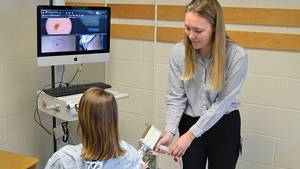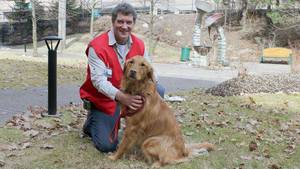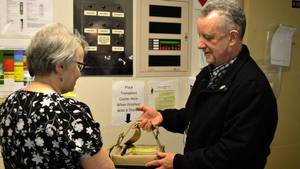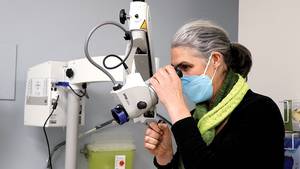Several months after finishing treatment for blood cancer, Chris Corkett says he feels stronger, continues to exercise weekly and he has an improved quality of life—thanks, in large part, to a 10-week low-intensity exercise program.
Chris found it hard to push himself to exercise after being diagnosed with blood cancer, even though he knew that’s exactly what he needed. So, when his wife saw a notice at their doctor’s office for the exercise program offered by the Halifax Peninsula Community Health Team, he decided to try it last spring. He was pleasantly surprised.
“It is nice to be in a group. It is motivating,” says Chris. “The program was designed specifically for you. The intensity was designed to match the need you had.”
When he enrolled in the program, a physiotherapist assessed him to determine his physical ability, measure his blood pressure, and help set realistic goals. He was encouraged to keep an exercise log and was taught how to monitor his exercise.
“We really focus on goal setting and behavioural change,” says Caroline Carr, Team Lead Primary Health Care with the Halifax Peninsula Community Health Team. “There’s a focus on how to maintain their exercise program after the classes are finished, including linking individuals with community physical activity resources when desired.”
The award-winning, Low-Intensity Exercise Program is just one of the many community-based programs that support patients of the QEII Health Sciences Centre who live with a chronic condition and limited mobility. These programs complement QEII care by helping patients function better at home and in the community.
Participants in the Low-Intensity Exercise Program are often referred to the program following their discharge from various areas of care at the QEII, including its cardiac and pulmonary rehabilitation programs, as well as the Nova Scotia Rehabilitation and Arthritis Centre. But Caroline stresses the program is open to anyone living with a chronic condition, such as heart disease, arthritis or diabetes, and people can even refer themselves. Most participants are over the age of 60, she says, adding that across the Halifax Regional Municipality, as many as 250 people take part in the program each year.
The first Community Health Team in the HRM was established in 2010. Since then, four teams have been offering many free programs to help Nova Scotians make healthy lifestyle choices and improve care for people living with chronic conditions.
“All of our programs are in neighbourhoods,” says Caroline.
The exercise program is offered mostly in local church or community halls, making it accessible to people close to home. Held twice a week, for just over one hour, each program is limited to about a dozen people. Classes include aerobic walking, strengthening, and stretching and balance exercises to help people achieve goals such as being able to carry a grocery bag into their house make the bed with less effort or to simply be able to enjoy their normal everyday activity.
By the end of the program, Chris noticed he could walk farther with the aid of his walker and he felt stronger. He was also motivated to keep exercising. At age 75, he now does a weekly exercise program at his church.
“We give them the tools to be successful,” says Caroline.
Chris’s success is not unusual. After completing the 10-week program, participants see an improvement in their blood pressure, as well as in the amount of time they can walk continuously, says Caroline. Six months after completing the program, about 50 per cent of participants had maintained their improvement in walking distance.
“We know the program is helping,” says Caroline. “It is definitely keeping people independent.”
To learn more about the Low Intensity Exercise Program, please contact the Community Health Team at 902 460 4560.








